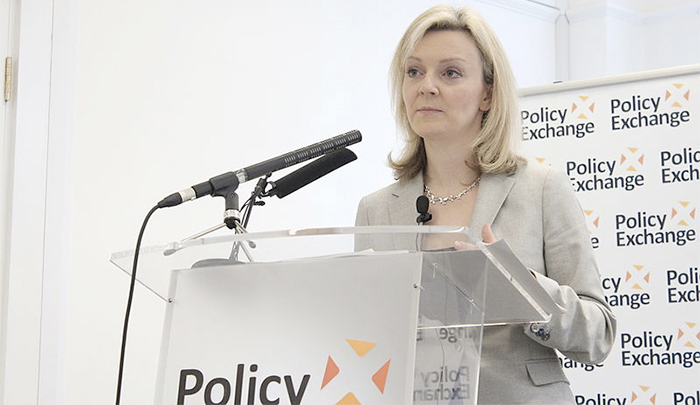
Membership of the EU is damaging the British farming industry, according to Environment Secretary Liz Truss.
"There are benefits to being in a single market, but there are serious costs," she told the Sunday Telegraph, and drew attention to the three-crop rule which she says is curtailing the freedom of farmers in the UK to decide what to grow.
Some arable farmers may have to grow three different types of crop as part of the European Union's greening policy.
"The three crop rule means that Brussels bureaucrats are going to be deciding what our farmers produce, rather than what consumers want, which is a problem."
"The best position for us is to get a good deal from the EU so we can stay part of a single market, but we can get rid of some of these regulations that hold back not just our own competitiveness, but also the competitiveness of the whole of the EU," she said.
David Caffall, Chief Executive of the Agricultural Industries Confederation, said: “What is clear is that the food and agriculture industries are complex and broad views need to be taken in policy development, especially at the European level. One has to question whether a ‘one size fits all’ approach can work across 28 Member States. Can one regulation be equally appropriate for the rain soaked pasture of the west of Ireland and the sun-baked terraces of the Mediterranean lands?”
EU exit 'biggest threat to UK farming'
A referendum of the UK's membership of the EU is the biggest threat facing British farming, Scotland's Rural Affairs Secretary Richard Lochhead said recently.
Speaking at the Oxford Farming Conference, Lochhead said farmers could lose Common Agricultural Policy (CAP) payments worth nearly £20 billion for this period 2014-2020.
“The CAP is a protective shield for UK agriculture," he said.
"Leaving the EU would mean leaving the CAP. It would be folly to think the UK Government would fund farming at anywhere near existing levels from domestic budgets and so the EU referendum is the biggest risk to agriculture in this country.
"We must have change - but reform must come from within Europe. The CAP must be simpler and more streamlined with food production at its core.
“Changing the budget allocations in future must be a priority. While Scotland is struggling to make ends meet with the lowest per hectare payment rates in Europe, other Member States have been given so much rural development funding they don’t know what to do with it. The needs to be addressed at EU and UK level."
The environment secretary, Elizabeth Truss, said the government wanted to stay in a reformed EU market.
"I want to keep the single market without having all the cumbersome costs of bureaucracy. We are negotiating very hard, but if we don’t get what we want then we are prepared to consider other options."
And farming minister, George Eustice, said: "Those who say you shouldn't have a referendum because people might want to leave have got to have a little bit more confidence in our democracy," Eustice, a Conservative, said.
"I think the right thing to do is carry out a renegotiation, get them to return some powers, go to the country, get a mandate and settle this debate once and for all."
The Rural Payments Agency paid out £1,370,328,624 to 96,669 SPS customers.
This equates to 95 per cent of all SPS customers and 91.4 per cent of the total estimated fund value. The target was for 93 per cent of customers and 86 per cent of total estimated fund value to be paid out by 31 December.
Farmers in the South West received £280 million in Single Payment support grants, giving much needed support to many farm businesses in the region.
Mark Grimshaw, RPA Chief Executive, said: "This performance shows just how far we have come in our drive to become a trusted, efficient and effective organisation and I want to thank our people and our industry partners who worked so hard to achieve this outcome.
"It delivers on our Business Plan pledge to continue offering the best service possible to farmers by maintaining our high performance, whilst preparing to deliver on new CAP policies and a new rural payments system next year.
"If farmers want to be paid as early as possible next year, then I would urge them to register on the new rural payments online service as soon as invited to do so. That’s because for this, the first year of Basic Payment Scheme (BPS), there will be lots to do as we gather new information and ask farmers to check that the details we hold are still correct. Once all their details are correct on our new online service it will be a lot quicker to apply in future years."
Mr Lochhead went on to warn that if the UK opted out of Europe, "there would be nothing stopping Westminster immediately delivering swingeing cuts to direct support for farming, leaving producers at the mercy of the market - a market where our competitors continue to receive direct support".
He added: "If the protective shield is removed then farmers in Scotland, and the UK, would be the first in the Treasury's firing line and our ability to produce food and our national interest would be jeopardised."
But he stressed CAP must be made "simpler and more streamlined, with food production at its core".
He told the conference: "Changing the budget allocations in future must be a priority. While Scotland is struggling to make ends meet with the lowest per hectare payment rates in Europe, other member states have been given so much rural development funding they don't know what to do with it. This needs to be addressed at EU and UK level."
